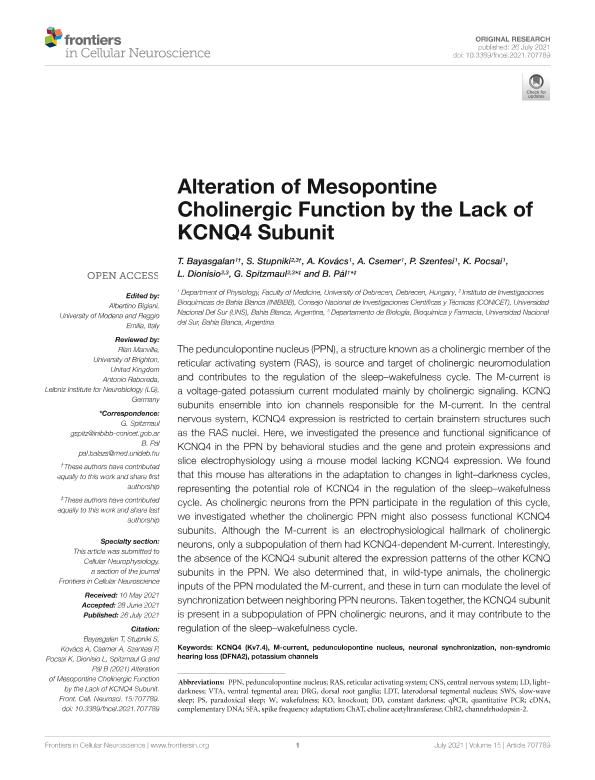Artículo
Alteration of mesopontine cholinergic function by the lack of KCNQ4 subunit
Bayasgalan, T.; Stupniki, Sofia ; Kovács, A.; Csemer, A.; Szentesi, P.; Pocsai, K.; Dionisio, Leonardo Raul
; Kovács, A.; Csemer, A.; Szentesi, P.; Pocsai, K.; Dionisio, Leonardo Raul ; Spitzmaul, Guillermo Federico
; Spitzmaul, Guillermo Federico ; Pal, B.
; Pal, B.
 ; Kovács, A.; Csemer, A.; Szentesi, P.; Pocsai, K.; Dionisio, Leonardo Raul
; Kovács, A.; Csemer, A.; Szentesi, P.; Pocsai, K.; Dionisio, Leonardo Raul ; Spitzmaul, Guillermo Federico
; Spitzmaul, Guillermo Federico ; Pal, B.
; Pal, B.
Fecha de publicación:
26/07/2021
Editorial:
Frontiers Media S.A.
Revista:
Frontiers in Cellular Neuroscience
e-ISSN:
1662-5102
Idioma:
Inglés
Tipo de recurso:
Artículo publicado
Clasificación temática:
Resumen
The pedunculopontine nucleus (PPN), a structure known as a cholinergic member of the reticular activating system (RAS), is source and target of cholinergic neuromodulation and contributes to the regulation of the sleep-wakefulness cycle. The M-current is a voltage-gated potassium current modulated mainly by cholinergic signaling. KCNQ subunits ensemble into ion channels responsible for the M-current. In the central nervous system, KCNQ4 expression is restricted to certain brainstem structures such as the RAS nuclei. Here, we investigated the presence and functional significance of KCNQ4 in the PPN by behavioral studies and the gene and protein expressions and slice electrophysiology using a mouse model lacking KCNQ4 expression. We found that this mouse has alterations in the adaptation to changes in light-darkness cycles, representing the potential role of KCNQ4 in the regulation of the sleep-wakefulness cycle. As cholinergic neurons from the PPN participate in the regulation of this cycle, we investigated whether the cholinergic PPN might also possess functional KCNQ4 subunits. Although the M-current is an electrophysiological hallmark of cholinergic neurons, only a subpopulation of them had KCNQ4-dependent M-current. Interestingly, the absence of the KCNQ4 subunit altered the expression patterns of the other KCNQ subunits in the PPN. We also determined that, in wild-type animals, the cholinergic inputs of the PPN modulated the M-current, and these in turn can modulate the level of synchronization between neighboring PPN neurons. Taken together, the KCNQ4 subunit is present in a subpopulation of PPN cholinergic neurons, and it may contribute to the regulation of the sleep-wakefulness cycle.
Archivos asociados
Licencia
Identificadores
Colecciones
Articulos(INIBIBB)
Articulos de INST.DE INVEST.BIOQUIMICAS BAHIA BLANCA (I)
Articulos de INST.DE INVEST.BIOQUIMICAS BAHIA BLANCA (I)
Citación
Bayasgalan, T.; Stupniki, Sofia; Kovács, A.; Csemer, A.; Szentesi, P.; et al.; Alteration of mesopontine cholinergic function by the lack of KCNQ4 subunit; Frontiers Media S.A.; Frontiers in Cellular Neuroscience; 15; 707789; 26-7-2021; 1-16
Compartir
Altmétricas



